- Home
- Hammond Innes
Levkas Man (Mystery) Page 2
Levkas Man (Mystery) Read online
Page 2
"When was that?"
"About three months ago."
"And you lived here?"
"For a week or two. It was pleurisy. He had to have someone to look after him."
"And where is he now?"
She hesitated. "Somewhere in Macedonia. I'm not sure where. He wouldn't think of writing to me. But my brother's with him and I had a card from Hans recently, posted at Skopje, which is in the south of Yugoslavia." She stared at me. "Why are you here? What have you come back for after all these years?"
"I need some money and a roof over my head."
"Well, there's no money here," she snapped. "The house is mortgaged, even the furniture, everything's sold that could be sold."
"You mean he's pawned the house to go looking for bones in Macedonia?"
That seemed to get her on the raw. "You don't understand him, do you?" she blazed. "You never did. He's one of the world's most brilliant palaeontologists and it means nothing to you. No wonder he spoke of you with contempt. You owed him everything—education, your upbringing, a roof over your head, even the food you ate, everything. And what did you do? Got yourself expelled, mixed with the riff-raff on the docks, stole, lied, beat people up, landed in jail ..."
"You seem to know quite a lot about me."
"Yes, I do—and everything I've heard about you sickens
me. You left him like a thief in the night, and now you come back—"
"It wasn't all my fault," I said quietly. "He's a very strange man and he expected too much."
"You took everything—gave nothing. Of all the heartless, selfish people . . . you didn't even answer his letters."
"I came to see him two years ago. But he was away. He always seemed to be away."
She sighed. "You could still have answered his letters. He was lonely. Didn't you realize that? No, I suppose not. You wouldn't understand what it's like to be alone in the world. But you could have written. That was the least you could have done." She gave a little shiver and drew her dripping mac tight to her body. "I'll go now. I can't stop you staying here, but I warn you, if I find anything missing, I'll call the police."
She was halfway through the doorway when I stopped her. "Have you any Dutch money on you?"
She turned, her eyes wide. And then after a moment she felt in the pocket of her slacks and produced a 20-guilder note from a purse. She seemed surprised when I offered her two pound notes in exchange. "No," she said quickly. "No, it's all right. I expect you need it." She looked at me speculatively for a moment, and then she was gone. I listened to her footsteps on the stairs, the sound of the front door closing, and from the window I watched as she crossed the bridge by the house barges and walked quickly down the other side of the canal, head bent against the rain and the lash of the wind. The house she entered was almost directly opposite.
It was unfortunate. She'd probably talk and I wondered what her father did. It would take time for them to trace me to Amsterdam, but it was dangerous and I'd need to move that bit faster. I switched out the light, put my raincoat on and went quickly down the stairs, cursing myself again for having involved myself in somebody else's troubles. I could still see the look on the man's face, the heavy jowls, the small eyes wide with sudden fear—bastards like that shouldn't be allowed to do their dirty political work in a free country.
I could have shipped out in a tanker that night. Stolk tipped me off in the Prins Hendrik by the Oosterdok. But it was bound for Libya, a quick turn-round and back to Amsterdam again. And anyway I was tired of ship routine. I had a feeling that this was a sort of crossroads in my life, that what I had done must lead me on to some new road. The sea was all I knew, but the sea is wide—Australia or South America, I thought. I wanted a new world, a new life. I was twenty-seven.
Dusk was falling, the night sky darkening over the Amstel river, when I finally found my way to Wilhelm Borg's shop on Amsteldijk. I hadn't seen him since the days when I'd been mixed up with his gang of dockside toughs. Quite a few Dutchmen had crossed my path in the five years that I had been at sea and Borg was reputed to handle anything from fake antiques to a lorry-load of Scotch. He had put on weight since I had seen him last. He looked prosperous now and the old oak furniture and brasswork in his shop were certainly not fakes.
He took me through into an office at the back, gave me a drink and listened while I talked. His round face was as innocent-looking as ever, but his eyes were colder. "You want a change, eh—something different. Why come to me?" He spoke Dutch with a Friesland accent. His family, I remembered, had been barge people from Delfzijl.
"Why does any man come to you?" I left it at that, not telling him I was on the run, but I think he guessed it.
I was talking to him for about half an hour before he said, "There are some things I want out of Turkey, collectors' pieces. You could be just the man."
"Smuggling?" I asked.
He smiled. "For you it would be just a pleasant little holiday. The sort of break I think perhaps you are needing. You charter a boat—out of Malta, I think—for a cruise in the Aegean. You go to Crete and Rhodes, behaving all the time like a tourist—eating in the tavernas, visiting the ruins of Knossos, the fortress of the Knights of St. John. And then you go north to Kos, possibly to Samos. Both these islands are very
close to Turkey. It's not organized yet, but you will almost certainly be making delivery to my clients somewhere off the Tunisian coast." He lumbered to his feet. "Think about it, eh?"
It was something, the escape door opening. Dangerous probably, but I didn't care. The Eastern Mediterranean, full of islands—you could lose yourself there, change jobs, change a name. "How much?" I asked.
He laughed and patted my shoulder. "You make up your mind, then we talk business."
I got him to change one of the two fivers I had with me, and that was that. It wouldn't get me to Australia or South America, but it was something to fall back on if things went wrong. I went to the Bali and stuffed myself full of Indonesian food.
It was about ten before I got back to the house, and when I switched the light on in the study, I found the curtains drawn and a note placed carefully on top of my suitcase. It said: Dr. Gilmore is in Amsterdam. He is another "bone" man and he would like to see you. I will bring him to the house at 11 a.m. tomorroic. Please be in. The writing was roimd and feminine. She hadn't bothered to sign it.
I crossed to the desk and read the letter I had glanced at before. Dr. Gilmore's world and the world of Wilhelm Borg were poles apart. I found it difficult to adjust my mind to the fact that here was a doctor of something or other at Cambridge University who seemed greatly excited over a piece of bone the old man had sent him. // you are right and this belongs to Cro-Magnon man, then I don't need to tell you how important it is. The dating puts it earlier than Les Eyzies or subsequent finds. I respect and understand your secrecy, but in view of the importance of this discovery I feel you have no right to keep the location to yourself. I have agreed to attend a conference at The Hague and will be arriving in Amsterdam on Sunday, March 16 . . .
Now, I was being asked to see him instead, and I wondered what the point was as I carried my suitcase up to my old room.
There I found the bed had been made up ready for me. It seemed an odd gesture in view of the things she had said. The water heater had been switched on, too, so that I was able to have a bath, which I badly needed. Lying there, naked and relaxed, I was amused by the girl's clumsy attempts to involve me. I was also mildly curious, so that after my bath I went back down to the bureau in the study and got the bundle of Cambridge letters from the secret cavity.
The signature was the same untidy scrawl, but they told me little about Dr. Gilmore. They were chiefly answers to scientific queries, all typewritten and highly technical, except one, which was in the Doctor's untidy hand and might almost have been referring to some criminal activity. Whilst I sympathize with you, I cannot, of course, condone. What you have done places you beyond the pale. Whatever you write, whatever you discover from now on,
will be suspect. You have affronted the moral rectitude of a luorld that, whilst often confusing truth, believes in it absolutely. However, whilst I cannot obviously defend your conduct in public, I want you to know that I understand and wish that it will make no difference to our long-standing friendship. That was all. Nothing stated, only implied. The notepaper was headed Trinity College, Cambridge, and dated April 21, 1935.
It was a long time ago now, but like the love letters from my mother, it had obviously been put there for greater secrecy. I found some Fuckink geneva in the usual place in the dining room sideboard, and as I sipped the old familiar liquor and browsed through his bookshelves, I wondered what he had done that had brought such a severe reprimand from a man who seemed to have been both tutor and a life-long friend.
The books ranged over everything associated with anthropology, and words and dates, sometimes whole passages, had been underlined; most of them had notes scribbled in the margin. A passage about the behaviour of an unusual insect caught my eye, chiefly because I had actually seen the coral-coloured flower take wing and it took me back to the dim-remembered life in Kenya.
The House in Amsterdam
17
The oblong blossom of this artificial flower is formed by the clustering of moths on a dead tiuig. An example of insect camouflage—yes, but it is something much more. Shake the twig and the moths rise in flight, then after a while they settle again on the twig and for a moment they are just moths of different colours craiuling over each other with no apparent purpose. But purpose there is, for in another moment order has replaced chaos and, suddenly, there is the flower again, the full flower, all coral—so perfect a blaze, so natural a form that humans are fooled into leaning doiun for the scent and birds ignore it in their flighting search for food. But there is more to this wonder yet, for the fiattids have not assumed a natural camouflage; there is, in fact, no real blossom that approximates to the form they take instinctively. They have thought this form up for themselves, creating it in the same way that an abstract painter creates a picture. And if you breed these little insects, you luill find that each batch of eggs produces at least one luith all-green wings, whose place will always be at the tip, several with shades of green tinged with coral, and the rest pure coral. In other words, the whole fantastic hoax is self-perpetuating from the egg to the twig.
For some reason insects and birds had meant more to me in those early years in Kenya than all the big game. Even the long journeys through the bush in the battered old Plymouth were remembered chiefly for the birds around Lake Victoria. The passage was heavily underlined with a date scribbled in the margin. And on the second shelf I found an album of photographs with pictures of caves and digs. One of them, heavily ringed in red, was of a scattering of bones, including the lower jaw and part of a cranium that looked human, laid out in the dirt at the bottom of some pit. Against the picture he had written: Only a hundred miles from Olduvai! The picture was not a very clear one, but further on in the album they became sharper and less faded, as though he had been able to switch to a better camera, and the captions ranged from Africa to Turkey, even Russia.
It seemed strange that he had never been able to commu-
nicate his own enthusiasm to me. I could remember his voice, dry and detached, talking about bones and flints and ape-men with long, impossible names, and it had all meant nothing to me, nothing at all. No doubt I was a great disappointment to him, but I couldn't help being the boy I was, and beating me hadn't helped. I could remember those beatings more distinctly than anything he had ever told me—his impatience, that barely concealed sadistic streak.
The books, and the geneva perhaps, made me feel suddenly sad. If he had gone about it differently, our relationship might have been changed. My life, my outlook, my whole behaviour pattern, too. I had finished my drink and was just on the point of going to bed, when my eye was caught by a group of foreign books on the bottom shelf, the dust wrappers still on and the titles curiously anonymous in an unknown alphabet. They contained no marked passages, no notes, but some of the pictures had been reproduced from the photographs in the album. They were, in fact, duplicate copies of two titles published in Russian. And on the same shelf, I found other copies published in Berlin, Prague and Warsaw. The East German edition carried his name in recognizable print—Dr. P. H. Van der Voort. I could find no sign of an English, or even a Dutch edition. He had always disliked the English, but that did not explain why his work only seemed to be recognized by the Iron Curtain countries.
I went to bed then. The wind had died, the rain had stopped. The house was very still as I lay thinking of the last time I had slept in that room, the urgent desire I had had to get away, the wild plans I had made. Now, once again, I had plans to make and it was a long time before I could get to sleep.
The sun was shining when I woke next morning. It was late and by the time I had been out for coffee it was almost eleven. I got back to the house only a few minutes before they arrived. Dr. Gilmore was small, neat and very alert for his age. "So you're Pieter Van der Voort's son." His hand was dry and barely touched mine, but his eyes and his smile had extraordinary warmth.
"Dr. Gilmore is a palaeontologist also," the girl said.
"Which means what exactly?" It was a word I had never really understood.
Dr. Gilmore smiled. "Put crudely, I'm a bone man—an expert on all types of fossils. It derives from the Greek: palaios —old; ontologia—the study of being. I like to think it was because he studied under me that your father specialized in palaeontology."
"I always thought of him as an anthropologist."
"Anthropology is a broad term covering the whole study of man."
"Dr. Gilmore is a leading authority on Stone Age Man," the girl said. "He is the author of Neolithic Settlements of Eastern Europe."
I took them up to the study and the old man paused in the doorway, his eyes travelling over the room. "I take it that this is where Pieter worked. I often wondered . . ." His gaze went unerringly to the bureau and he walked over to it and stood for a moment, peering closely at the skull and the artefacts. He was like a bird, his eyes bright, his movements quick. But age showed in the stoop of his shoulders and in the dry, parchment texture of his skin, which was slightly chapped with the winter's cold. "There you are. Miss Winters," he said, turning to the girl. "That's what all the trouble was about." His voice, his whole manner, was extraordinarily boyish. He shook his head. "Too clever. Too clever by half, you see."
I sat him down at the desk and offered him a cigarette. He hesitated, smiling quietly to himself. "I have been told to cut down." But he took one all the same and I lit it for him.
"You wanted to see me," I said.
He nodded and leaned back in the swivel chair, holding the cigarette between thumb and forefinger, puffing at it quickly, drawing the smoke into his lungs. "But I don't know whether it will help. I was hoping to find you—" he hesitated— "a more academic type. Now I'm not certain that it will do any good, particularly as I gather you haven't seen your father for some time."
"Not for eight years," I said.
"It's as long as that, is it?"
"We didn't get on very well . . ."
"No, no—I understand. Miss Winters has told me something of your relationship. A very difficult man. Very brilliant. Too brilliant in some ways. I would go further—a genius. Men of that calibre are never easy to live with." He waved his hand at me. "Sit down, my dear fellow, sit down."
I hesitated. As long as I was standing I felt I could cut the interview short. I didn't see what he wanted, why the girl had brought him here. And I didn't want to get involved. "I know nothing about his world—"
"Of course. I understand. And that makes it very difficult for me—to explain my sense of uneasiness." He looked at me, a long, appraising stare, his eyes grey like pebbles as they caught the light from the windows. "But perhaps that's an advantage—that you know nothing about his world." And then he surprised me by saying, "I met your mot
her once. In London during the last war—nineteen forty-two, I think; I was up for a meeting of the Royal Society and he brought her to see me at my hotel. A charming woman, very good for him. Gave him confidence. They should have married." He was smiling to himself, a gentle, quiet smile. "Companionship of that sort would have made all the difference. She had a strong, unselfish personality."
"He has a strong personality, too," I said, wondering at his reference to a sense of uneasiness.
"Yes, but not unselfish." And then abruptly he said, "He kept a Journal. Has done for many years. Did you know that?"
"A leather-covered book?"
He nodded.
"Yes," I said. "There's a secret cavity in the bureau over there. That's where he kept it." And without thinking I told him how I had once surprised him writing in it.
He nodded. "Yes, that would be it. A very personal document."
"Well, it's not in the usual place," I said, thinking that that was what he had come for. "I imagine he's taken it with him."
But he shook his head. "No, I have it. And there are altogether three volumes of it now. I've just read them. That's why I wanted to see him. It's a very strange, very disturbing record—not a diary exactly, something much deeper, more personal. It covers about twenty years of his life—intermittent entries, about himself, his thoughts, his inmost fears and hopes. And then suddenly, when he was ill . . ." He stopped there and turned to the girl. "You tell him. Miss Winters. It will have more immediacy coming from you."
She nodded. "He was going to burn it. That was the night I telephoned for a doctor. He had me light a fire here in the study. He was in bed at the time. I thought perhaps he was feeling better, and then he sent me out for something. When I came back, I found him down here, half-collapsed in his chair, and the Journals were lying on the floor. Several pages had already been ripped out and their charred remains were lying in the grate. When I asked him why he had done it, he said, 'I don't want him to have it. I don't want anybody to have it.' And he asked me to put it on the fire for him. 'That's the best place for it.' "

 High Stand
High Stand The Doomed Oasis
The Doomed Oasis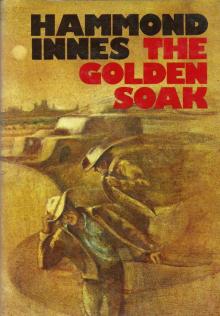 Golden Soak
Golden Soak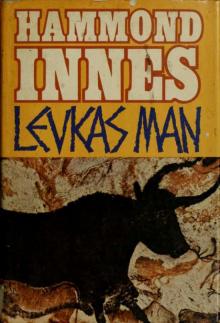 Levkas Man (Mystery)
Levkas Man (Mystery)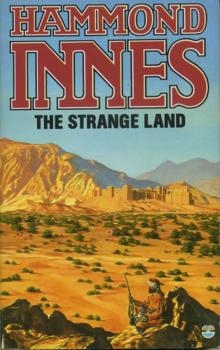 The Strange Land
The Strange Land Dead and Alive
Dead and Alive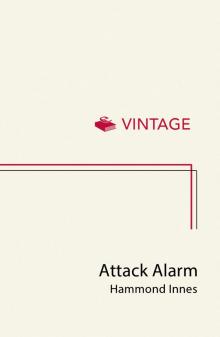 Attack Alarm
Attack Alarm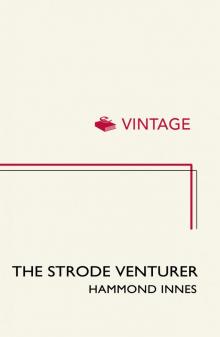 The Strode Venturer
The Strode Venturer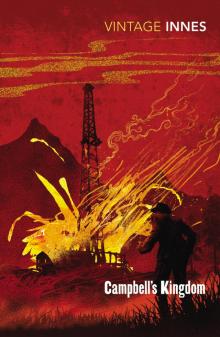 Campbell's Kingdom
Campbell's Kingdom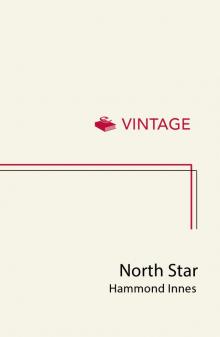 North Star
North Star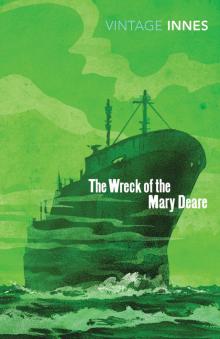 The Wreck of the Mary Deare
The Wreck of the Mary Deare The Lonely Skier
The Lonely Skier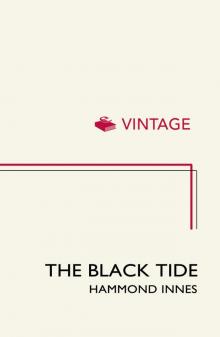 The Black Tide
The Black Tide The Trojan Horse
The Trojan Horse Medusa
Medusa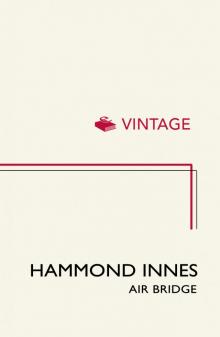 Air Bridge
Air Bridge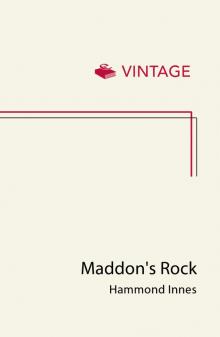 Maddon's Rock
Maddon's Rock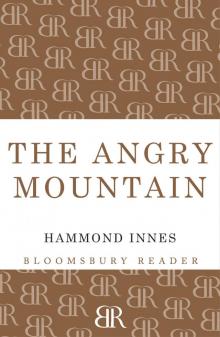 The Angry Mountain
The Angry Mountain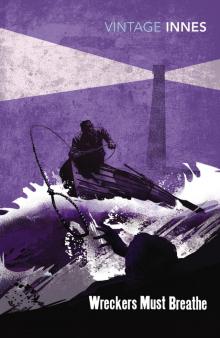 Wreckers Must Breathe
Wreckers Must Breathe Solomons Seal
Solomons Seal The White South
The White South